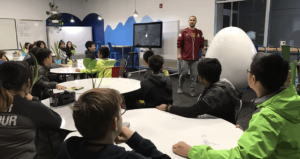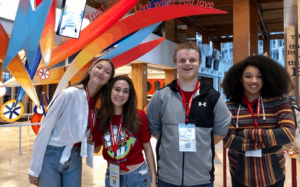U.S. chief technology officer Aneesh Chopra Sept. 14-16 led a high-powered delegation to India to find out more about education, e-governance, energy and information technology.
Members of the delegation told India-West that items discussed in New Delhi with top Indian leaders and during a one-day whirlwind trip to Rajasthan could provide a blueprint for the agenda for President Barack Obama when he visits India in November.
 The delegation, which included Alec Ross, senior advisor of innovation for Secretary of State Hillary Clinton, met in New Delhi with an Indian government team led by Sam Pitroda, advisor to the Prime Minister on public infrastructure and innovation and former chairman of the National Knowledge Commission. The delegation, which included Alec Ross, senior advisor of innovation for Secretary of State Hillary Clinton, met in New Delhi with an Indian government team led by Sam Pitroda, advisor to the Prime Minister on public infrastructure and innovation and former chairman of the National Knowledge Commission.
Meetings in Delhi were attended by government ministers, members of India’s Planning Commission and Innovation Council, members of Parliament, leaders of industry, U.S. Embassy officials and leading venture capitalists.
The delegation was a follow-up to the U.S.-India Innovation Exchange announced by Clinton and External Affairs Minister S.M. Krishna during the June 4 U.S.-India strategic dialogue, the U.S. Department said in a press release prior to the visit.
“This delegation aims to deliver projects ready for investment and ultimate market entry. All projects will be characterized by strong U.S.-India collaboration and a clear path to execution,” the statement said.
The visit to Jaipur and nearby areas, which ended with a long bus ride back to Delhi in the wee hours of the early morning, included a briefing at Kanpura Gram Panchayat in Ajmer District about the state’s new fiber-optics-based e-Panchayat initiative; a give-and-take town hall meeting with TiE’s Rajasthan chapter; and a visit to the Barefoot College at Tilonia.
Six people outside the U.S. government, including four Indian Americans, were hand picked to join the White House delegation.
The Indian Americans were: Neeru Khosla, wife of Venture capitalist Vinod Khosla and co-founder and chair of free and textbook distribution nonprofit CK12 Foundation; serial entrepreneur Naren Bakshi of Silicon Valley, a key catalyst for the TiE chapter in Rajasthan; Ravi Vishwanathan, general partner at venture capital firm NEA; and Intel vice president Sriram Vishwanathan.
The other two outside invitees were Tom Vander Ark, former executive director for education at the Bill and Melinda Gates Foundation and partner of Revolution Learning, a Seattle, Wash., and Austin, Texas-based private equity investor focused partly on global learning in India; and John Palfrey, faculty co-director of the Berkman Center for Innovation & Society and vice dean for library and information at the Harvard Law School.
Members of the U.S. delegation and leaders in Rajasthan gave high marks to Chopra for his energy and enthusiasm. He even joined a Rajasthan dance performance to demonstrate some Bhangra steps at one point.
Bakshi, who grew up in Rajasthan, told India-West that the e-Panchayat e-governance initiative was “very well received by the delegation and they foresee great opportunities emerging in this direction.”
“As the e-panchayats scale up and cover more areas there are various possibilities like application building, health services, education, skills development, mobile telephony services that can be looked at from the point of view of entrepreneurs.”
The meetings in Jaipur included the chief secretary and senior state bureaucrats from the IT, education, energy, urban development and other government departments. Bakshi said the chief secretary has appointed IT Secretary Sanjay Malhotra and Energy Secretary Naresh Pal Gangwar to represent the state in further interactions with the U.S. government.
“The highlight of the visit was the town hall meeting with TiE which was attended by about 250 entrepreneurs, business executives, NGOs, academicians and students,” he added.
Bakshi, who visits Rajasthan frequently to meet with the TiE chapter members and entrepreneurs, pointed out that Tech Crunch columnist Vivek Wadhwa, senior research associate at the Labor & Worklife Program at Harvard Law School and executive in residence at Duke University, in a recent column said the TiE chapter is one of the “best examples” he has seen of a “cluster development.”
“In a few short years, that group has turned the sun-blasted state once known for backwardness and poverty into an up-and-coming destination for top technology companies around the world,” Wadhwa wrote, adding, “Over a short period of time, Jaipur rose from nowhere to contend for technology companies looking for a home in India.”
Atul Kapoor, president of TiE Rajasthan, told India-West by e-mail that the U.S. delegation “more than met our expectations.” It “energized us immensely and gave some specific recommendations which were very useful.”
“The most promising highlight was the energy and the positive attitude of the entire delegation,” Kapoor said, adding that Chopra “has an effervescent personality, and is bubbling with enthusiasm, ideas and energy.”
“His positive attitude filtered down to the entire delegation and what we saw was a host of highly charged-up and energetic individuals looking for specific opportunities and tangibles. They did not skim the surface but went deep into the problem to find technological solutions which could be handled in a rural setting on a large scale,” Kapoor said.
“The trip was very fascinating, to find out what’s happening in education in India,” Neeru Khosla told India-West, adding that it was surprising to see how similar the problems are in education in India and the U.S.
She said she and Vander Ark were “able to break away to visit a school complex unannounced.” This school managed to have 44 out of 74 recent graduates accepted at the IITs. “They are bringing in a certain philosophy that is very interesting to see,” Khosla said.
She said she has worked with Chopra before on physics textbooks when he was chief technology officer of the state of Virginia, so she was not surprised by his enthusiasm on educational issues.
Khosla said that the delegation had established groundwork for what could become more lasting partnerships in the educational sector between the U.S. and India.
Jayshree Periwal, director principal of the Step by Step Group of Schools in Jaipur, told India-West by e-mail that her organization hoped to form “some broad business plans of educational institutions, and if possible, take some projects to the planning stage and beyond.”
“Specifically, we were looking to replicate a highly successful big town private school in the smaller towns and maybe even the larger villages. We hoped to find a way forward for achieving this with financial and technological aid. We also hoped for some guidance on how to set up a university in collaboration with American colleges and universities.”
The trip “met our expectations to a great degree,” she said. “The high-powered delegation was able to give us great insight into how good educational models could be replicated for mass action. The concept of aid and venture capital and how they could be made available for this purpose were clearly listed out.”
Periwal said that interacting with Vander Ark and “getting his thoughts on how the replication of a school model could be done was the biggest take-away.”
Bakshi said the White House delegation and the India team have agreed to work over the next four to six weeks to finalize “a set of actions before Obama’s visit.” They also plan to name teams to implement “each of the selected high priority items.” |
|




 The delegation, which included Alec Ross, senior advisor of innovation for Secretary of State Hillary Clinton, met in New Delhi with an Indian government team led by Sam Pitroda, advisor to the Prime Minister on public infrastructure and innovation and former chairman of the National Knowledge Commission.
The delegation, which included Alec Ross, senior advisor of innovation for Secretary of State Hillary Clinton, met in New Delhi with an Indian government team led by Sam Pitroda, advisor to the Prime Minister on public infrastructure and innovation and former chairman of the National Knowledge Commission.


0 Comments
Leave a Comment
Your email address will not be published. All fields are required.